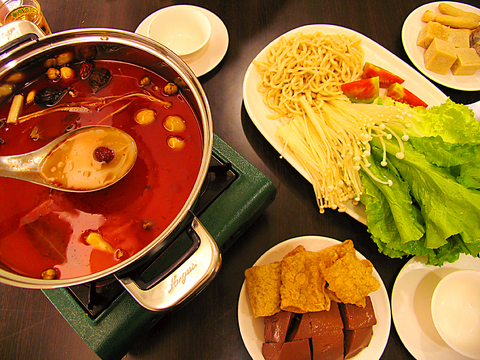Finding this Mongolian hotpot restaurant can be the first adventure of the evening. The address would have you believe it's located in the labyrinth of lanes and alleys off Bade and Guofu Roads. In reality, it sits prominently on the north side of Civil Boulevard, some 100m west of Yenji Street. Part of the reason you suspect it's nestled deep in the neighborhood is the name of the place. "We looked for over half an hour," said a woman at the next table. "They should print a map on their advertising." Actually, they haven't had to advertise much at all. A look at the several newspaper and magazine write-ups that cover the walls is the first clue that Longtang is a not very well-kept secret. The house specialty milk-soup hotpot, the place's only real claim to Mongolian cuisine, is worth looking a half hour for.
Whatever you might think of boiling meats and vegetables in a milk broth, you shouldn't knock it until you've tried it. The soup is stewed with a cornucopia of spices, ginger, dried plums and several hard-to-recognize stems and leaves. It comes to the table a deep red color. Don't be fooled; the red is chili oil floating on top. Even ordered xiao la, or only slightly spicy, this stuff is a three-alarm fire.
A good trick is to first spoon the soup into your bowl and blow on it before sipping -- not to cool it off; blowing on it moves the super spicy chili oil out of the way so what you first taste is the soup, not the spice.

PHOTO: DAVID MOMPHARD, TAIPEI TIMES
Into the pot go all the usual hotpot fixings: mushrooms, lettuce, those things that look like shelled crab legs, meats and more. The two-person pot comes with a smallish plate of sliced beef, but you'll be doing yourself a favor to get a platter of sliced lamb. With the temperatures dropping, lamb is back in season. It's a traditional "hot food" because eating it slightly raises your body temperature. Cooking it to perfection in the pot isn't much more difficult than boiling water. Once the pot is bubbling, wash a single lamb slice in it for no more than 30 seconds, or until it turns white-ish, dip it into your favorite sauce. Once your eyes have stopped tearing and your nose isn't running, you realize just how tasty a hotpot it is.
One last trick for cooling down: The set meals come with a small dish of shredded papaya (the Mongolian variety?) save it for when you really need it to cool your taste buds.

From the last quarter of 2001, research shows that real housing prices nearly tripled (before a 2012 law to enforce housing price registration, researchers tracked a few large real estate firms to estimate housing price behavior). Incomes have not kept pace, though this has not yet led to defaults. Instead, an increasing chunk of household income goes to mortgage payments. This suggests that even if incomes grow, the mortgage squeeze will still make voters feel like their paychecks won’t stretch to cover expenses. The housing price rises in the last two decades are now driving higher rents. The rental market

July 21 to July 27 If the “Taiwan Independence Association” (TIA) incident had happened four years earlier, it probably wouldn’t have caused much of an uproar. But the arrest of four young suspected independence activists in the early hours of May 9, 1991, sparked outrage, with many denouncing it as a return to the White Terror — a time when anyone could be detained for suspected seditious activity. Not only had martial law been lifted in 1987, just days earlier on May 1, the government had abolished the Temporary Provisions Effective During the Period of National Mobilization for Suppression of the Communist

When life gives you trees, make paper. That was one of the first thoughts to cross my mind as I explored what’s now called Chung Hsing Cultural and Creative Park (中興文化創意園區, CHCCP) in Yilan County’s Wujie Township (五結). Northeast Taiwan boasts an abundance of forest resources. Yilan County is home to both Taipingshan National Forest Recreation Area (太平山國家森林遊樂區) — by far the largest reserve of its kind in the country — and Makauy Ecological Park (馬告生態園區, see “Towering trees and a tranquil lake” in the May 13, 2022 edition of this newspaper). So it was inevitable that industrial-scale paper making would

Hualien lawmaker Fu Kun-chi (傅?萁) is the prime target of the recall campaigns. They want to bring him and everything he represents crashing down. This is an existential test for Fu and a critical symbolic test for the campaigners. It is also a crucial test for both the Chinese Nationalist Party (KMT) and a personal one for party Chairman Eric Chu (朱立倫). Why is Fu such a lightning rod? LOCAL LORD At the dawn of the 2020s, Fu, running as an independent candidate, beat incumbent Democratic Progressive Party (DPP) lawmaker Hsiao Bi-khim (蕭美琴) and a KMT candidate to return to the legislature representing